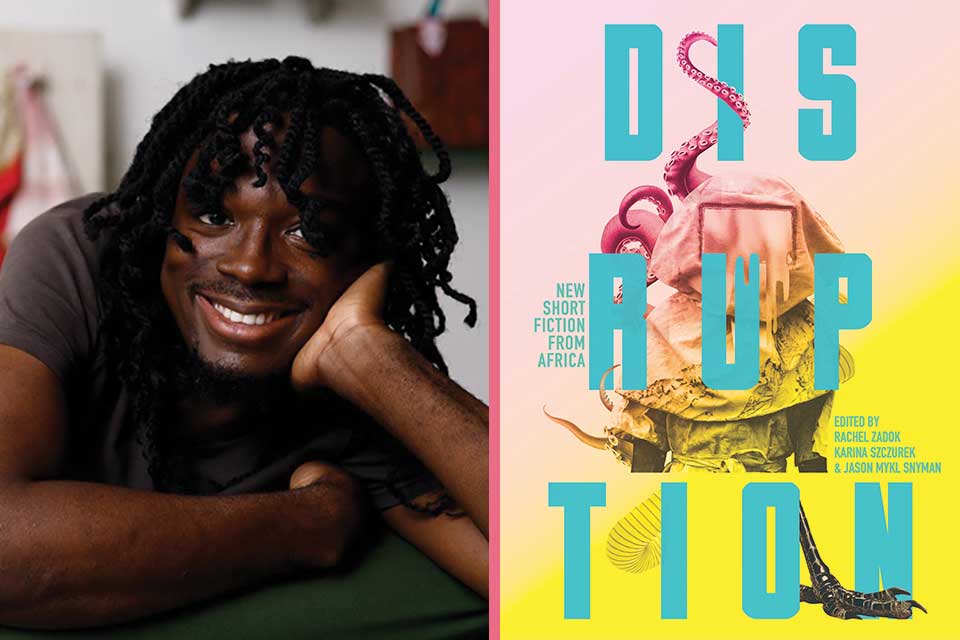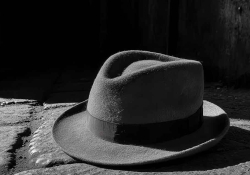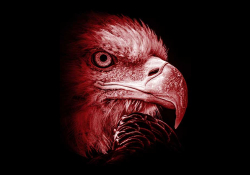When the Levees Break

Drawing inspiration from the writing of Lesley Nneka Arimah, Edwin Okolo creates a world of birth factories, colossal levees, secret labs, and New Biafra, where we find Ameli, Lotanna’s wife—because he chose her.
Those colossal levees, rising from the banks of the Benue, were the features she’d grown to love best in New Biafra. Unlike the obsolete levees of past centuries, these skyward-reaching panes stood as high as her enhanced retinas could see; frosted by clouds like the rim of a giant shot glass. It was hard to tell exactly how tall each pane stood, but the rumours she’d heard, back when she lived in Nnewi Metropolis, were that they cleared the stratosphere. What was known was that they had taken over fifty years to construct, installed to forestall flooding.
No one knew how the water came, or why, but it always did. According to annals of the past, the first water purge came gurgling up from the earth, burying the residents of the Benue plains in a mudslide. The second water purge came in the form of a tsunami; the third, rains that wouldn’t cease. The fourth, as predicted by the scientists who ran the secret labs stationed in forts along the coast, would be a disaster of God-like proportions. The fourth levee was thus installed, dormant in an empty moat, pinned into the earth by pneumatic pumps, waiting for God to yet again renege on his promise to never again destroy the world with water. Tourists from what was left of the paler continents skulked around the frontier, some for years, waiting to witness this once-in-a-lifetime event.
But Ameli had grown to love the levees for a different reason. In the life before, Biafrans had been fascinated with purification. But in the life after, it became their religion. New Biafra had grown rich by researching and patenting techniques that reinforced solid materials by removing their impurities. The pinnacle of this innovation was the development of Iko, a substance useful in the world before, but revered in this one. The levees were made from it, a technological marvel even for a nation forced into a premature fifth industrial revolution.
While the people of new Biafra worshipped purification, they also worshipped obfuscation. Visits to the frontier were expressly forbidden to anyone not of high birth with clearance. Those who disobeyed were swiftly punished. The magnificent levees were as much a prison as they were a protection from those creatures haunting the treacherous oceans.
The magnificent levees were as much a prison as they were a protection.
Ameli was intrigued by these creatures, some of which were trapped in the murky cage of the levee moat. There was something sludge-like that was all mouths and no eyes, and a chimaera that was half-heron, half-snake. But the most restless were the fish-like monsters, corded in muscle with a rash of spores across their flanks.
It worried her that none of them could break free.
“The Iko is deceptive,” Lotanna had told her when she asked if the creatures could damage the levees. “Each sheet is impenetrable, as wide as a train cab, and soundproof too. Which is why you can’t hear the Ekwensu’s whining.”
His cheeks swelled with pride whenever he spoke of the levees. “Every centimetre of New Biafran Iko is completely transparent, without a speck of impurity. It’s so clear, the foolish Onyeocha actually think they are touching the creatures when they press their bodies against the panes.”
Ameli tried to stay silent around Lotanna. She had been raised to always tell men the truth, but this could be dangerous. Silence usually sufficed in lieu of a lie.
She knew he disliked her fascination with the creatures corralled by the levees, but there was little else to do. She especially liked to watch the youngest of the creatures, or so she thought from its playfulness. Its svelte limbs ended in fingers and toes fused by webbed skin into awkward fans. Its sides were serrated, each slit a vent that yawned and constricted as the creature breathed through hidden gills. The creature’s smile split its face nearly in half, and it could dislodge its jaw. It often did, amusing itself with the limp lower half of its face. It was covered in a slick layer of iridescent slime that refracted the light filtering into the water. It spent its days drifting, aware of the other creatures but indifferent to them, its saucer-like eyes enraptured by all it could see beyond its enclosure.
It was in love with humanity, or hungry; with the monsters, you could never quite tell.
* * *
Marriage was inevitable. The caste into which she was sorted served only three functions in New Biafra; worker, wife, whore. Ameli had come to life in Aba, a small worker town renowned for its birth factories, with everyone groomed to be a worker before they reached adolescence. She was too delicate to be a worker, her joints were too fragile, her brain prone to wandering. These same reasons made her a lousy whore. In the sex simulations her handlers had run, they found she retreated so deeply into her mind, the simulation was finished with her hours before she broke from her dissociative daydream. At a loss, they lined her up along with several dozen other defectives, and asked Lotanna and four other officers of the crown to choose their companions.
Ameli was grateful Lotanna had chosen her, even though he took her for the first time in the corridor outside the hostels, after he’d walked her back to her cubicle. He’d kept his eyes on the sophisticated camera bulb in the ceiling, as though daring the guards in the surveillance room to come take her away from him. They didn’t. In New Biafra, unions were considered binding as soon as the man chose.
She was on the underground to the frontier and its levees, previously an urban myth, a week later. They should have left the very next day, but something had happened in one of the other megacities, Chinese whispers of a mathematician falling from the sky. Lotanna left immediately, then sent for her. When she’d arrived, he insisted on picking her up from the tubular station, carrying her across the threshold as they used to do in the vintage films.
“You are my woman,” he’d whispered as they rutted for the first time on the floor of the living room in her new home, “you are mine forever.”
She’d kissed him so she wouldn’t have to say anything in return, and looked past his head out at the window. The young Ekwensu loomed on the other side of the Iko, watching them.
* * *
He stayed for a year, a prolonged honeymoon in which they rutted whenever he wanted, his desire kept ravenous by the supplements he fed himself every morning. It was good that her serviceable parts were made to withstand the worst wear. She didn’t mind the sex; sometimes she even enjoyed it, although after that first time, he stopped letting her look away from him.
She filled the breaks between with questions. He answered honestly, even the difficult ones. He never had any questions for her; after they had married, they’d given him a log file and a virtual sign-in to an archive of all her memories.
He told her about the levees, or at least what he knew of them. They were losing 30 kilometres of coastline with every purge, and if the purges kept happening, New Biafra would be gone in 300 years. They were here so he and the other scientists could prevent the next purge. The levees existed only to stall the inevitable while researchers sought a more permanent solution. An unfortunate consequence of their artificial moat were the creatures that had become trapped there.
They were here so he and the other scientists could prevent the next purge.
* * *
“Stop staring at that thing, it is an Ekwensu, a fucking devil.”
He came home one day to find she’d rearranged the kitchen so she could stare out the window while she cooked. He stomped to the blinds, dragged them shut and rounded back to her, tightening his fists around her shoulders and shaking her before he pulled her towards him.
“These things, the way they watch us, is evil. The records say none have ever tried to escape, never directed violence at the levee. But nothing likes captivity, at least nothing that is good.”
She nodded, agreeing to the second half of his outburst, feeling him harden against her. He was more forceful than usual, as though he was trying to prove a point.
She modulated her voice box accordingly.
* * *
On the first day of the second year, he shipped out for the first time. She didn’t ask him to stay; they both knew her opinion meant little. Cadets who weren’t predestined to be preternaturally gifted mathematicians became scientists through rigorous training and a contract that signed their freedom away to the crown. By the time they graduated, ready to join the race against the next purge, they were already warped from their original impressionable selves in ways that only companionship revealed. Scientists and engineers were encouraged to marry for this reason, and to women like Ameli. Women who were moulds onto which they could project the worst of themselves.
When he left, Ameli felt longing, more for the familiarity of their routine—rutting and talk and the occasional passionate quarrel—than for him.
The next week, a package came for her, Lotanna’s scrawl familiar on the box.
I couldn’t answer all your questions, but maybe these will.
In it were a dozen books, some aged, most brand-new. Physical books were rare; this must have cost him much. She was gentle as she separated the books, burying her face in each one. She’d never been given anything that was purely for her entertainment before.
All the books were about the frontier, some set before the first purge, most after. Her favourite was a memoir by the matriarch of the first shoreline colony, a woman who had chosen to age when the novelty of eternal youth and nanotech healing was all the rage. She’d lived through the first two water purges and recorded the third, her memoirs the first documented account of the creatures. The blurb on the back of the book called her accounts “delicious hearsay,” but Ameli devoured it as truth.
Book gifts arrived once a month, and as the outside world seemed a chore to enter, she let herself wallow in them. Occasionally, she allowed herself to enjoy the petty knowledge of being the only wife on the frontier who received such gifts.
* * *
When Lotanna came for his first conjugal visit eight months later, he did so unannounced. That night he sat her on the bed, brought out a box and placed it gently on her lap. It was warm and heavy, and moved when she shook it. She opened the flaps to reveal black eyes and a snout that immediately nuzzled her arm.
Lotanna grinned: “Purebred, no modifications, no augmentations. Cost me a small fortune.”
Her heart broke open for him for the first time since they married. They rutted after, frightening the puppy in its makeshift cot with their intensity. She came for him, unfettered from restraint, her howls travelling through the night. He was gone by the morning, leaving her a mother of sorts.
* * *
Nkita seemed obsessed with the creatures of the levee, the Ekwensu especially. Lotanna had messaged on the stream to tell her what to name the dog, cackling at an inside joke he wouldn’t share. When the puppy crossed into adolescence, grew big enough to rest his paws on the kitchen sill, he would park himself within its light and stare at the creatures; barking as the youngest Ekwensu swam past. Ameli recognised that it had some measure of sentience, and saw everyone at the frontier as clearly as they saw her, looming in their horizon.
As a year passed and as Nkita grew, he became attuned to her moods in ways she’d thought impossible for a rare purebred. She rewarded him with food off her plate and trips to the banks of the levee, where he darted around, running alongside the young monster as she amused him, creating sprightly spectres from the luminous sludge flaking off her skin. And as Ameli taught the dog to play fetch, to sit on cue, rewarded him with entertainment and treats, she felt the Ekwensu’s gaze on her.
* * *
Lotanna’s visit in their fifth year came earlier than she expected. He visited twice in that second year, twice in the third, and once every year after. As his absences grew, the intensity with which he rutted her and scolded her increased, past forceful to desperate. Then he showed up at their door months before he was expected, a kitten in his giant paws.
“There’s an infestation in the rig. Litters everywhere, they were going to cull them,” he said, pausing to look at their dog staring longingly out the window, “. . . the runt needed a home, and Nkita needs a sister.”
She took the kitten from him, brushed her fur, feeling for the tell-tale click of nanites before letting her amble into the house. As appreciation, Lotanna took her in the doorway, unbothered that the neighbours could hear them. She clung to him, noticing as they pressed their bodies together that his belly pouch was gone. She ran her hands over each pill of recently formed muscle, and wondered what else was new about him.
They sat in the kitchen while he and the dog ate breakfast, the kitten padding across the kitchen counter. He paused mid-swallow and asked her: “Do you like that creature?”
She knew who he was talking about. Or rather what. He had warned her not to anthropomorphise the creatures of the levees, calling this a “human flaw.”
“I am curious about it.”
“I hear you take the dog to see it, that it plays with him. That they are ‘friends’?”
Ameli’s voice quivered. “Nkita is descended from hunters, I think he sees her as prey.”
Lotanna’s spoon clattered in his bowl.
“Her?”
There was a wicked slant to the amusement in his voice.
“Her,” Ameli replied, steeling her spine.
“Her,” he said again, his voice laced with warning.
She shouldn’t have responded, but the words came unbidden. “You are never here, and if you are not here, then you cannot tell me what to do or not do. We’re not in the metropolis, none of all that protocol applies here.”
Lotanna grimaced, placing his spoon beside his half-eaten mash. He pushed out of his chair and rounded over to her, resting a cold hand on her shoulder.
“You’re right, Ameli,” he whispered in her ear. “We are not in the metropolis anymore; those rules don’t apply here.”
* * *
She woke and found Lotanna’s side of the bed was made, as though he’d not spent the last month and a half at home with her and Nkita and the cat, for whom he took to wearing a puffy hooded jacket inside out, carrying her in its hood, so she could nuzzle his neck.
The smooth sheets worried her; he wasn’t a man who cleaned up after himself unless he was making a point. She got out of bed, cortisone pumping dread into her, and padded into the hall. He’d cleaned while she slept, emptied out the cupboards and the pantry, stripped the house of all its luxuries.
He wasn’t a man who cleaned up after himself unless he was making a point.
Ameli rounded the apartment twice more, stalling, against what, she wasn’t sure. The front door stood in darkness, the only sign he’d left that he had been there. She turned the knob. It didn’t budge. She turned it again, putting more of her strength into it, the nanites in her system rushing to her fingers and strengthening the joints. It made no difference; he’d pneumatically sealed the door into the wall. She tried for the better part of the day, but there was nothing that worked, nothing made sense. Exhausted and famished, she forced herself to take another tour of the house to confirm what she already knew; only the taps were working, the house was stripped of everything else.
It was then she realised, he had taken the animals with him.
* * *
He came back exactly a year later, to the day. She didn’t hear him open the door, or pad into the house, the dog she’d raised as hers at his side.
But she knew he was there, as plainly as he knew the nanites would keep her alive. She was silhouetted by the light streaming in from the window, the one that Nkita used to leap up against as a pup, staring at the young Ekwensu, who was preening, turning the usually clear water milky with iridescent film.
Lotanna watched, unsure if he had permission to address her. Eventually Ameli sighed, her unblemished skin caving around her diaphragm and turned to Lotanna, naked as day, a layer of grime salting her flesh.
His heart sank and his grip tightened around the end of Nkita’s leash. Her eyes followed the leash and settled on the hide collar around his neck. They rose back up to him, accusing; they’d agreed to never use a leash on the dog.
“Is this what you wanted?” she asked.
“I only planned to go away for a week, enough to teach you a lesson.” He stuttered, “. . . but something happened at the labs in the metropolis, so I stayed. The cat ran away.”
She repeated, more slowly this time. “Is this what you wanted?”
“You are nothing like that monster. You needed to be reminded of that,” he said.
He beckoned to her and she came, knelt at his feet the way she’d been taught at the birth factory all those years before. Outside their window, the creature swam, freer in her pond than Ameli had ever felt in her entire life.
* * *
He moved them to another tenement the next day, and stayed the rest of the year. The lab for which he worked had stumbled on a technological breakthrough and accelerated it into the testing phase, which meant the scientists had to return to their wives and wait to see if they would still be needed in the new year.
“If it works, involuntary retirement follows,” Lotanna told Ameli, as they lay in bed, her body pliant in his arms, Nkita splayed out at the foot of the bed.
She’d nodded, acknowledging that he had spoken and turned herself towards him, sensing his pulse heighten as his hands brushed against her thigh.
There was no more fight to her, and Lotanna hated it. Her curiosity and flares of defiance had amused him earlier in their union, surprised him even. But he’d always seen her as property first. The other scientists at the testing labs told him far worse stories than how he’d chosen to punish Ameli for disobeying him by obsessing over the Ekwensu. One had taken his woman’s limbs away; another had decided his woman had lost the privilege of a voice.
Lotanna was informed of her infatuation with the Ekwensu at its very beginning, but ordered to not interfere. Women were allowed their own fascinations in their own time, provided they did not cause harm.
Ameli hadn’t gone to the levee since Lotanna’s return, but she would sit in the kitchen and wait for the Ekwensu, leaving the room only to attend to her husband’s needs. Lotanna noticed that the Ekwensu had stopped acknowledging his wife. It would swim past their window, a flit of iridescence, and disappear for days. For a creature so grand, its ability to cloak itself terrified Lotanna. Ameli just waited, her patience inexhaustible, her listlessness a heavy shroud over their marriage.
Nkita stayed at her side, but Ameli wished he wouldn’t. They had done something to the dog in those months at the kennels at the lab complex. His boisterousness was gone, his intuition dulled to just a hint of intelligence.
When the call to return to work came with the first rains of the new year, Lotanna embraced it with urgency. He took Ameli to the banks of the levee the morning he was leaving, and put the dog’s leash in her hands.
He kissed her on the cheek, with such lightness his lips felt like a gentle wind.
“Goodbye.”
* * *
They sent one person, a woman, in a simple dress and with a cast-iron box strapped to her back.
The woman was her first visitor in a year, since Lotanna left the frontier, returning to the metropolis to be feted for his boundary-defying scientific breakthrough.
Lotanna’s team had found a way to siphon away the water in the levees by creating a perpetual steam turbine, the excess steam fed away from the earth by New Biafra’s new-fangled but essentially useless space elevator. No one wanted to talk about all that frozen water orbiting the earth, but they’d ignored climate change for four hundred years, too. Until it became a present threat, the turbine retained its status as a revolutionary solution.
She’d somehow been blocked from being able to search his name or see his streams. But word spread in the frontier, even to a pariah like her. There was talk about reclaiming land and rumours of new conquests, a return to the old ways. They were even jailing dissenters.
This woman, however, didn’t look like a dissenter. She didn’t look like a matron from the birth factories in Aba and Nnewi town where Ameli had been raised. She looked . . . fathomless.
The woman waited at her threshold, even though the door was wide open. Nkita looked to Ameli for a command, but she shook her head and beckoned the woman in. The new house didn’t feel like hers anyway.
“Did he send you?” Ameli whispered.
The woman shook her head. “No one sends me. I come when I am needed.”
“Do you know what is happening with him?”
“It is better not to know.”
“He did it, didn’t he?” Ameli asked, even though she already knew.
“Yes,” came the unvarnished reply. “Your union has been annulled from the capital, and you have no other skills that require your continued existence. We are forced to rescind your right to a life and its paraphernalia. Lotanna is more generous than most; he asked that you be allowed to live out your remaining years with your animal companion.”
She’d known officials were coming to the frontier, everything ended up on the stream, but she’d thought they were coming to inspect the levees or maybe even conduct the bi-annual psychological evaluation of all the frontier’s citizens. She’d allowed herself to worry about this a few times, but nothing could have really prepared her for him actually leaving her. Especially because the scientists had no say in what happened to their wives once they chose to annul.
The nanites in her body, unsure of the source of pain, pulsed under her skin. She sank to the ground, her body contorted with grief as the woman watched. The dog pressed its weight down on her and gave a comforting howl. The creatures in the levees responded to his howling, their agitations causing tremors that travelled inland and gently rocked the foundations of her house. The sound quietened Ameli instantly.
“I’m sorry it has to be this way,” the fathomless woman said.
There wasn’t much to think through. The woman was just a formality. She rubbed Nkita’s jowls and hugged him. He’d been loyal to her, her only true companion.
“Do I have to wait?” Ameli asked.
The woman paused. “No, I am equipped to aid your transition in whatever way you desire.”
Ameli sighed. “I have one request. Keep my dog safe.”
The woman nodded. Even after Lotanna changed Nkita’s titanium collar for a hide one, she’d never used his leash, never even touched it where it hung next to the door. The dog padded over to the woman’s side and nudged his leash into her hand.
* * *
Ameli chose execution. It was archaic, barbaric even. But her life had been so sedentary that she wanted her ending to be momentous. Window curtains darted open as she passed, as the tenants of the other apartments tried to piece together what was happening. She didn’t envy them.
They walked to the levee, the woman behind her leading the dog. She held an unwieldy shotgun in her hand, one of the treasures in the black box she had brought. The woman and the tools in her black box were relics from life in the before, traditions that were carried over even though they had no place in this technological future. The injection the woman had offered her was swimming in her veins, setting her nerves tingling and quieting the screaming in her brain. She tried to think of Lotanna in the Metropolis. He would start a new life, with a new bride from the birth factories. She wondered if he’d give her books, too.
She stopped. It was close enough to the water that she could see the older creatures. She hadn’t seen the Ekwensu in weeks, and felt a small pang of disappointment that the creature was still shrouding herself from her.
“Here?” the fathomless woman asked.
Ameli straightened her spine. “Yes.”
Amelia felt the mouth of the shotgun part her curls.
The woman grunted. Ameli felt the mouth of the shotgun part her curls. She had a few seconds to panic, and she tried, shutting her eyes so tightly she saw floaters. She heard a click and felt heat rushing through the barrel, singeing her hair. The force of the blast rocked her head, and she heard her neck snap. She fell forward, her vision blurring into whiteness.
Was this death?
She had no frame of reference to tell.
She turned her head towards the levees, surprised she still had vision in one eye. The nanites in her body had never had cause to work in an emergency, and she was impressed at how efficiently they worked. The fathomless woman straddled her and aimed the rifle at her prone body.
They both noticed her at the same time: the Ekwensu on the other side of the wall. Her fused hands pressed against the stacked panes, her giant eyes softened with concern. Ameli had never seen her this close; the creature had acknowledged her before, but never with this much intimacy. Her face was at least six feet long, her irises striated with colours she’d only heard of. She mouthed the words as best she could as the second set of shots rang out.
“Help me: I don’t want to die.”
She didn’t hear the sound or see the flare from the barrel. All she felt was the violent rumble of the earth as the Ekwensu launched itself with a deafening crack against the levee. Water began to spurt from the first razor-thin blemish.
Lagos
Author’s note: This is set in the world that Lesley Nneka Arimah built in the title story in her collection When a Man Falls from the Sky (Riverhead Books). I use her term “New Biafra” and cite her phrase “Chinese whispers of a mathematician falling from the sky.”
Editorial note: From Disruption: New Short Fiction from Africa, edited by Jason Mykl Snyman, Karina M. Szczurek, and Rachel Zadok (Short Story Day Africa and Catalyst Press), forthcoming in September.















